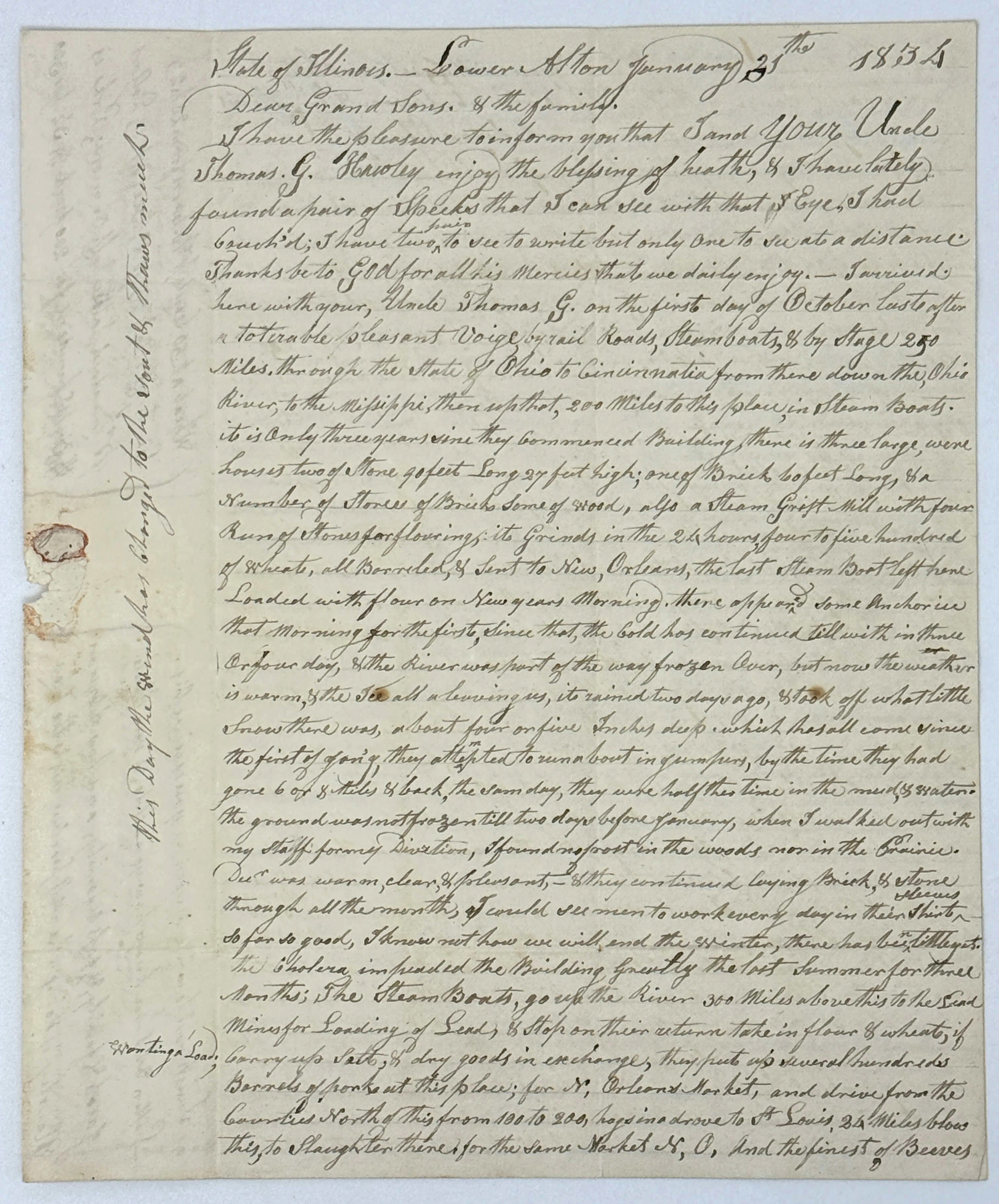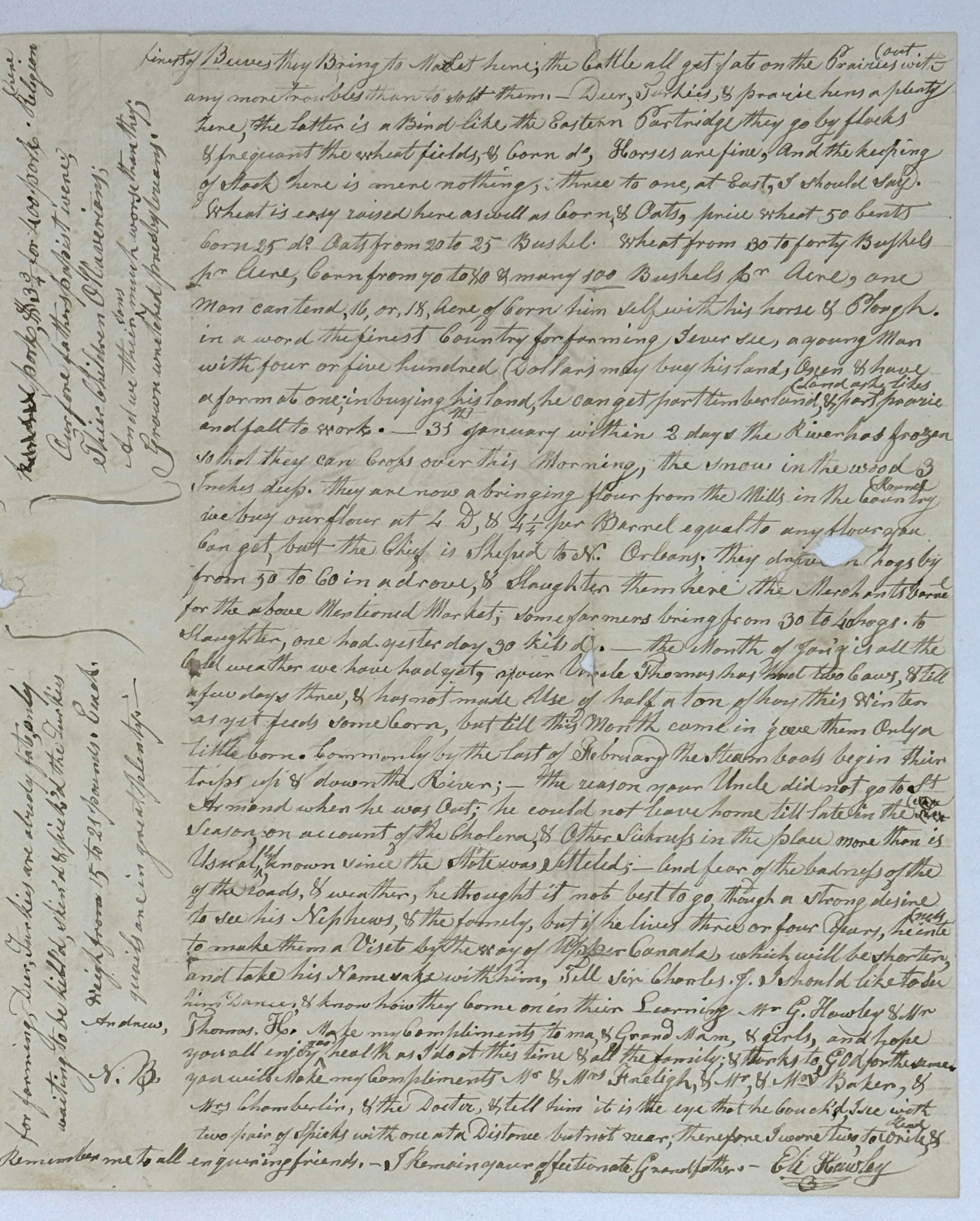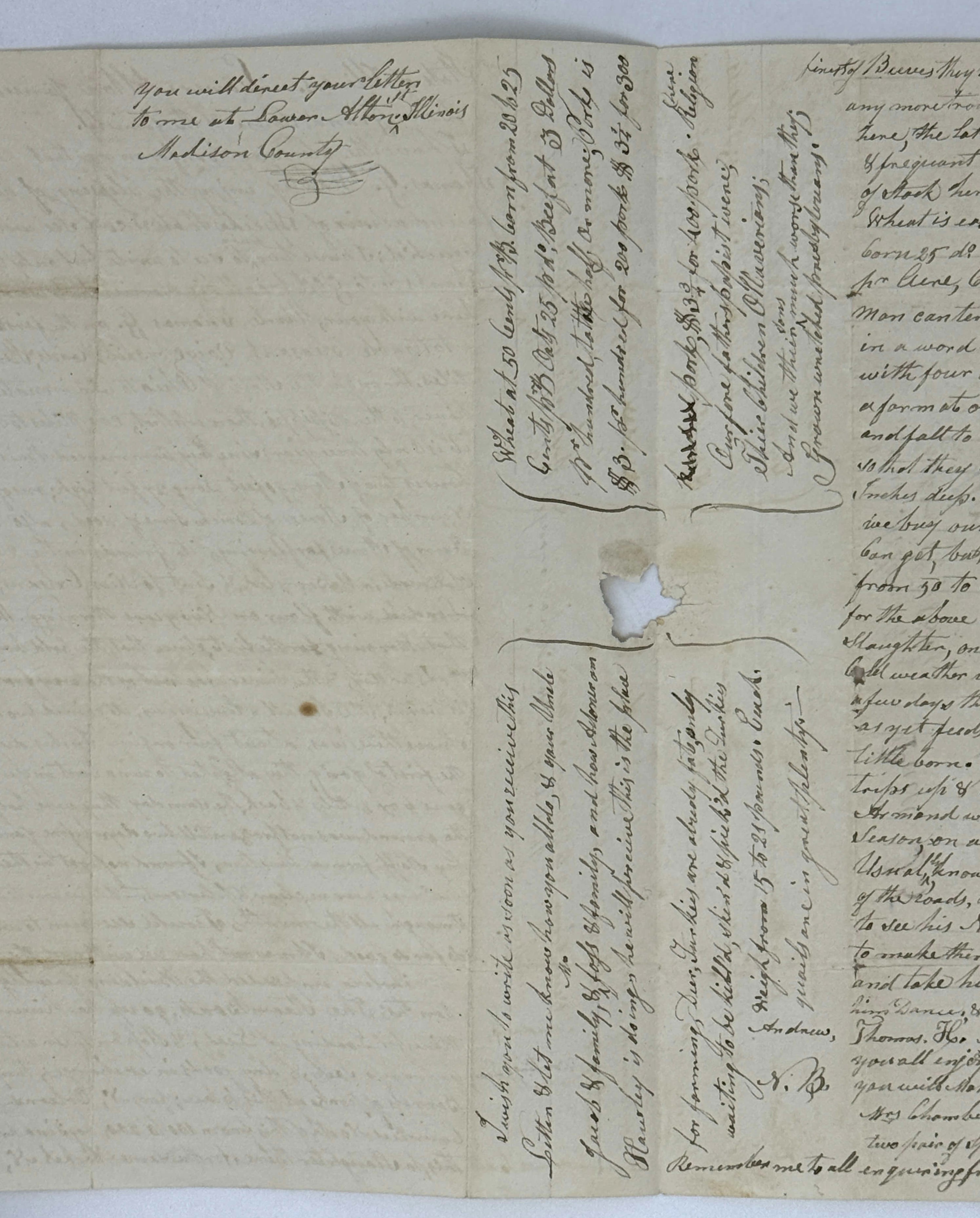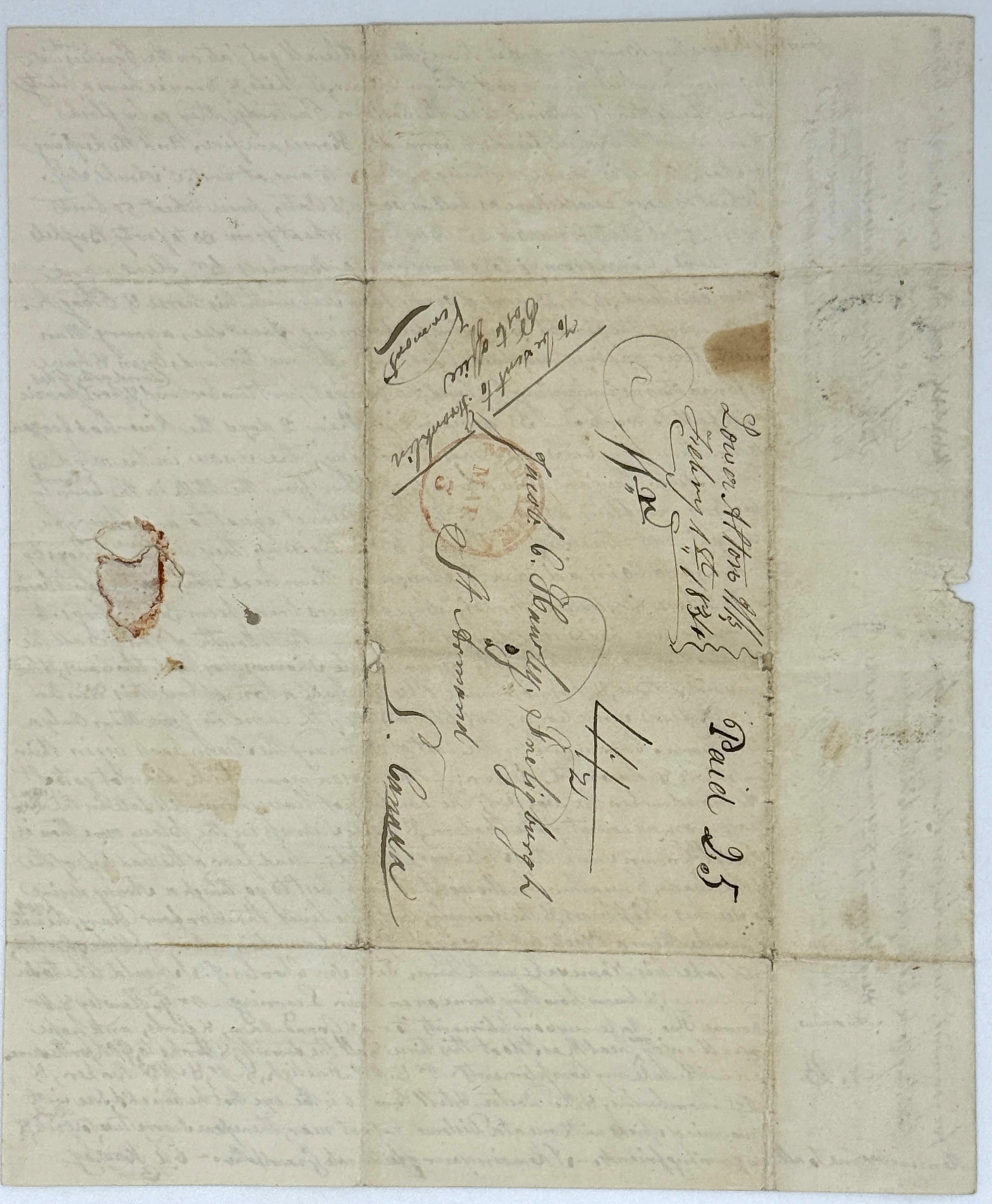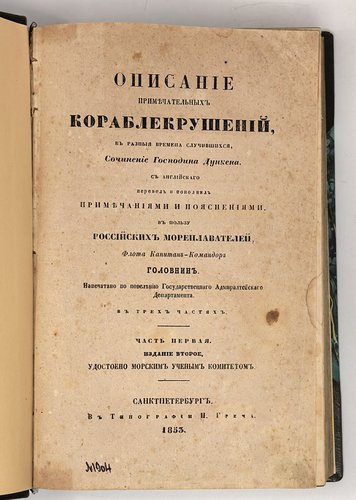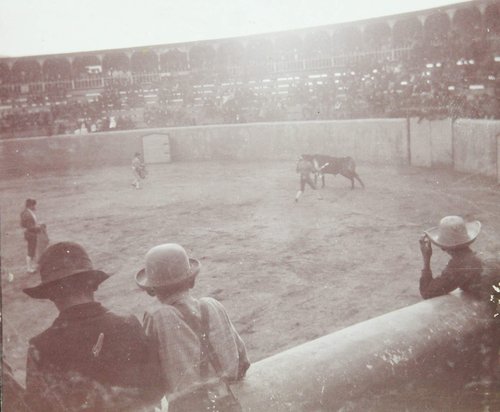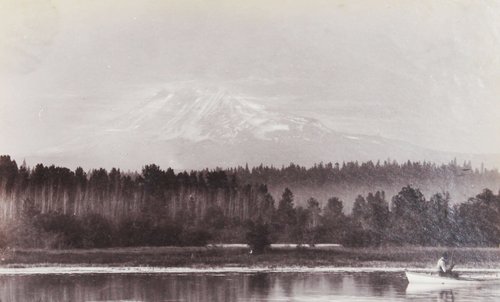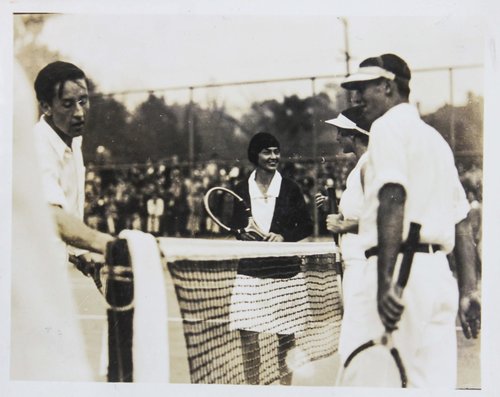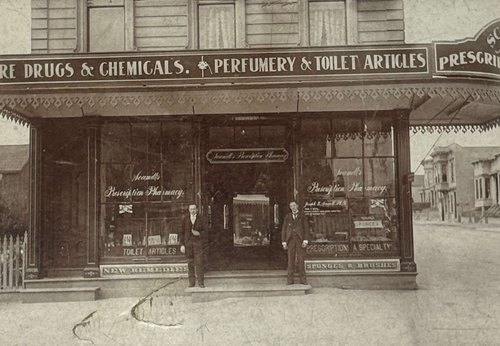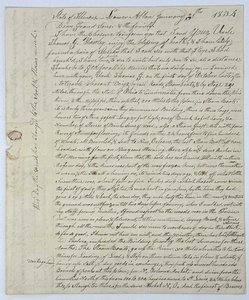
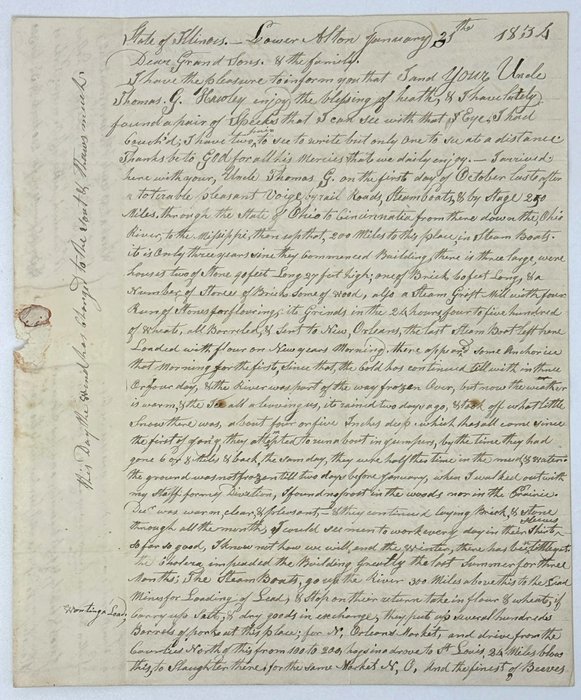
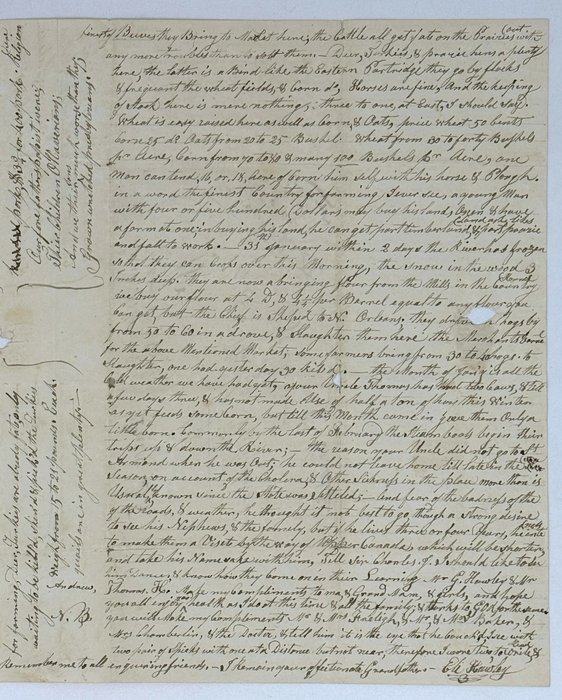
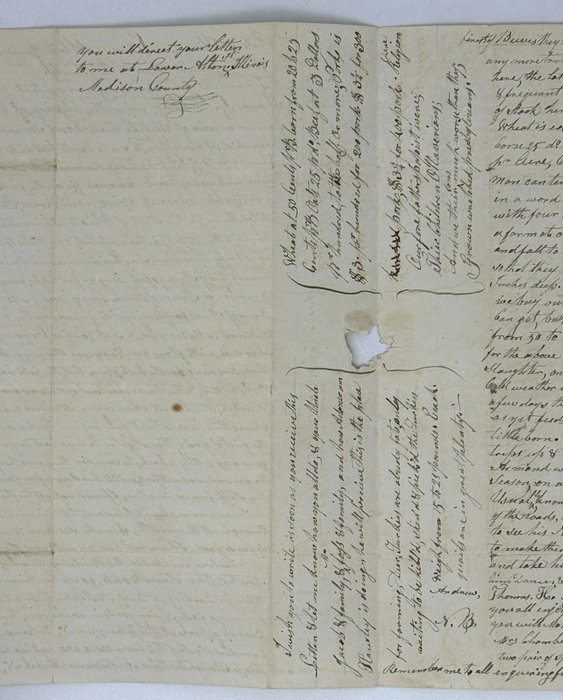
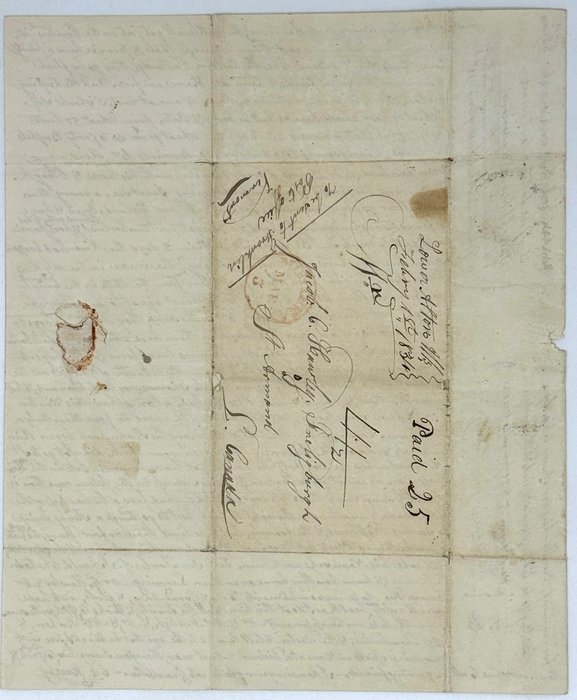
#MC93
1834
Quarto (ca. 9.5 x 8 in.). 4 pp. Brown ink on yellowish wove paper. Stamped and addressed (Jacob Hawley) on the verso. Fold marks, a couple of small holes (with words affected), but otherwise a very good interesting letter, written in a legible hand.
Historically important early autograph letter by a pioneer of Lower Alton, Illinois, with notes on the town’s building boom and a recent cholera outbreak.
Lower Alton, established in 1818 along the Mississippi River, grew rapidly during the 1830s as part of the westward expansion. Its strategic location made it a vital hub for steamboat travel and trade between St. Louis and upriver towns. The decade witnessed a building boom, with mills, brick stores, and warehouses transforming the once-rural settlement into a bustling frontier town for settlers, merchants and farmers.
The letter was written on January 31, 1834, by Eli Hawley (ca. 1757-1850), one of Lower Alton’s earliest settlers. As the context suggests, he moved to Illinois in the autumn of 1833 with his son, Thomas Hawley (1789-1863), who would later serve as the city treasurer. Eli made the move at the age of 77 and spent the remainder of his life in Alton, passing away at 92.
In the letter addressed to “grand sons & the family,” the author recounts his journey to Illinois and outlines the early route to Lower Alton—by railroad, stagecoach, and steamboat along the Ohio and Mississippi Rivers. Eli describes the town in the midst of a building boom, with new brick stores, large warehouses, and a steam-powered mill under construction. He notes that a recent cholera outbreak has significantly slowed progress and that illness is far more common than it ever was back in the city. Hawley also praises the region’s fertile farmland and thriving flour production, citing detailed crop yields, market prices, and the affordability of land. In the rest of the letter, he emphasizes the ease of raising livestock, the abundance of wild game, and the growing trade networks to New Orleans and nearby settlements.
Overall, historically important early autograph letter from the early days of Lower Alton, Illinois.
Excerpt from the letter:
“I have the pleasure to inform you that I and your Uncle Thomas J. Hawley enjoy the blessing of heath, & I have lately found a pair of Speeks that I can see with that eye, I had couch’d; I have two pairs to see to write but only one to swat a distance. Thanks be to God for all his mercies that we daily enjoy. I arrived here with your Uncle Thomas G. on the first day of October last after a tolerable voige, by rail Roads, Steamboats, by stage 250 miles through the State of Ohio to Cincinnati from there down the Ohio River, to the Mississippi, then up that, 200 miles to this place, in Steam Boats. It is only three years sinc they commenced building, there is three large, were houses two of stone 30 feet long 27 feet high; one brick 60 feet long, a number of stores of bricks some of wood, also a steam grift mill with four run of stones for flowing; it grinds in the 21 hours four to five hundred of wheat, all barreled & sent to New, Orleans, the last steam boat left here loaded with flour on New years morning. There appeared some anchor in that morning for the first, since that, the Gold has continued till with in three or four day, the River was part of the way frozen Over, but now the weather is warm, the – all a – us, it rained two days ago, took off what little snow there was, about four or five inches deep. Which has all come since the first of jan’y, they attempted to run about in jumpers, by the time they had gone 6 or 8 miles & back, the sam day, they were half this time in the mud & water. The ground was not frozen till two days before January, when I walked out with my staff for my divition, I found no frost in the woods nor in the -. – was warm, clear, pleasant – they continued laying brick, & stone, through all the month, I could see men to work every day in their sleeves shirt, so far so good. I know now how we will end this winter there has been little yet the Cholera impended the Building greatly the last summer for three months; the steam boats, go up the River, 300 miles to the Lead mines for loading of Lead, & stop on their return take in flour & wheat, if carry up salt & dry goods in exchange, they put up several hundreds barrels of pork at this place; for N, Orleans market, and drive from the Counties North of this from 100 to 200, hogs in a drove to St Louis 24 miles blow this, to Slaughter there, for the same market N, O, and the finest of Beeves to Market her; the Cattle all get fat on the Crairies with any more troubles to – them. Deer, Turkies, prarie hem a plenty here, the latter is a bird like the Eastern Cartridge they go by flocks & frequent the wheat fields, & corn, horses are fine, and the keeping of stock here is mere nothing; three to one, at east, I should say wheat is easy raised here as well as Corn & oats, price wheat 50 cents corn 25, oats from 20 to 25 bushel, wheat from 30 to forty bushel per acre, Corn from 70 to 80 & many 100 bushels per acre, one man can tend, 16 or 18 acre of Corn him self with his horse & -. In a word, a finest Country I ever see, a young man with four or five hundred dollars may buy his land. Oscar & I a farm at one; in buying his land he can get part timber land, & part poarie and fall to work. 31 January within 2 days the River has frozen so that they can cross over this morning, the snow in the wood 3 inches deep. They are now a bringing flour from the Mills in the Country, we buy our flour at 4 D, & 4 ¼ per Barrel equal to any flour you can get, but the chief is shiped to N. Orleans, they drive on hogs by from 50 to 60 in a drove, & slaughter them here the Merchants Corn for the above mentioned market; some farmers bring from 30 to 40 hogs to Slaughter, one had yesterday 30 kild. The month of Jany is all the cold weather we have had yet, your Uncle Thomas has had two cows & still a few days threw,& has not made use of half a ton of hog this winter as yet feeds some corn, but till this month came in gave them only a little corn. Commonly by the last of February the steam boats begin their trips up & down the River; - the season your Uncle did not go to St. Armond when he was out; he could not leave home till late in the Season, on account of the Cholera, & other sickness in the place more than is usual, known since the state was settled, - and fear of the badness of the roads, & weather, he thought it not best to go, though a strong desire to see his Nephews, & and the family, but if he leaves three or four years, he intends to make them a visit by the way of Upper Canada, which will be shorter and take his namesake with him, tell Sir Charles J. I should like to see him Dance, & how they come on in their learning…”

